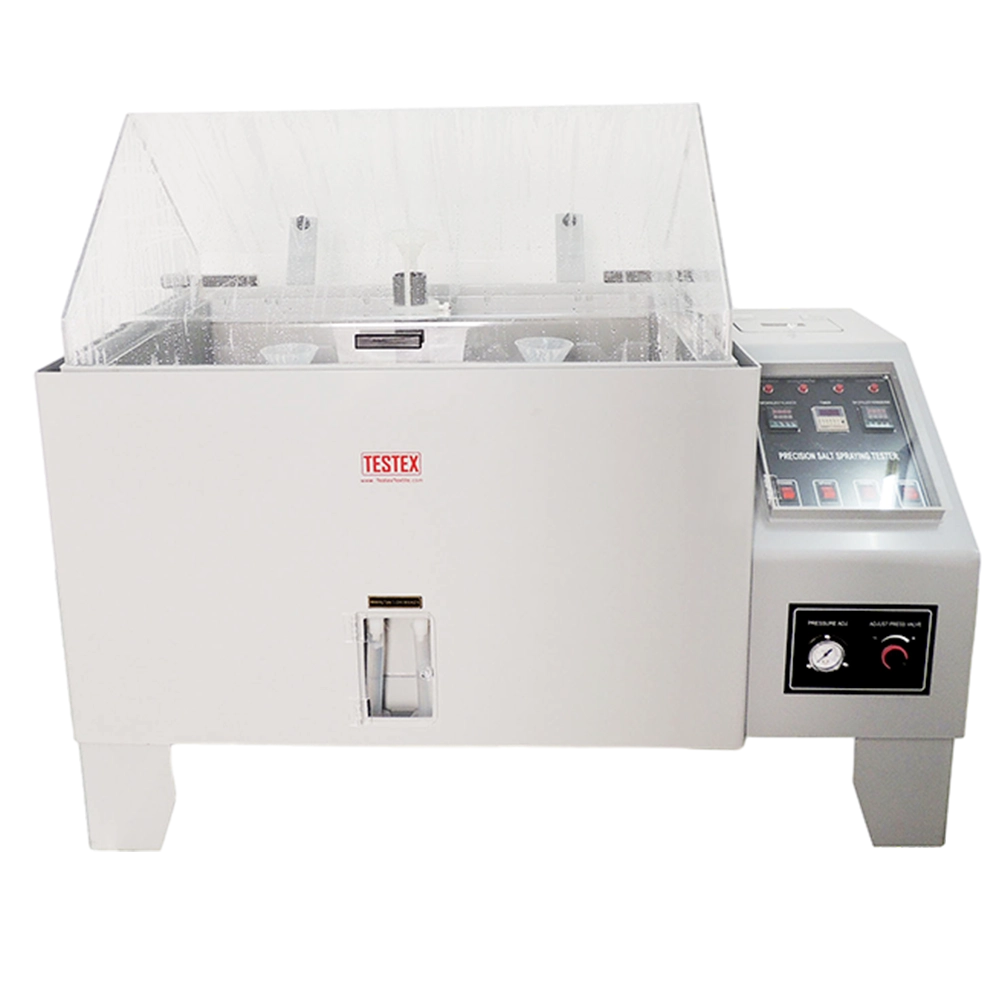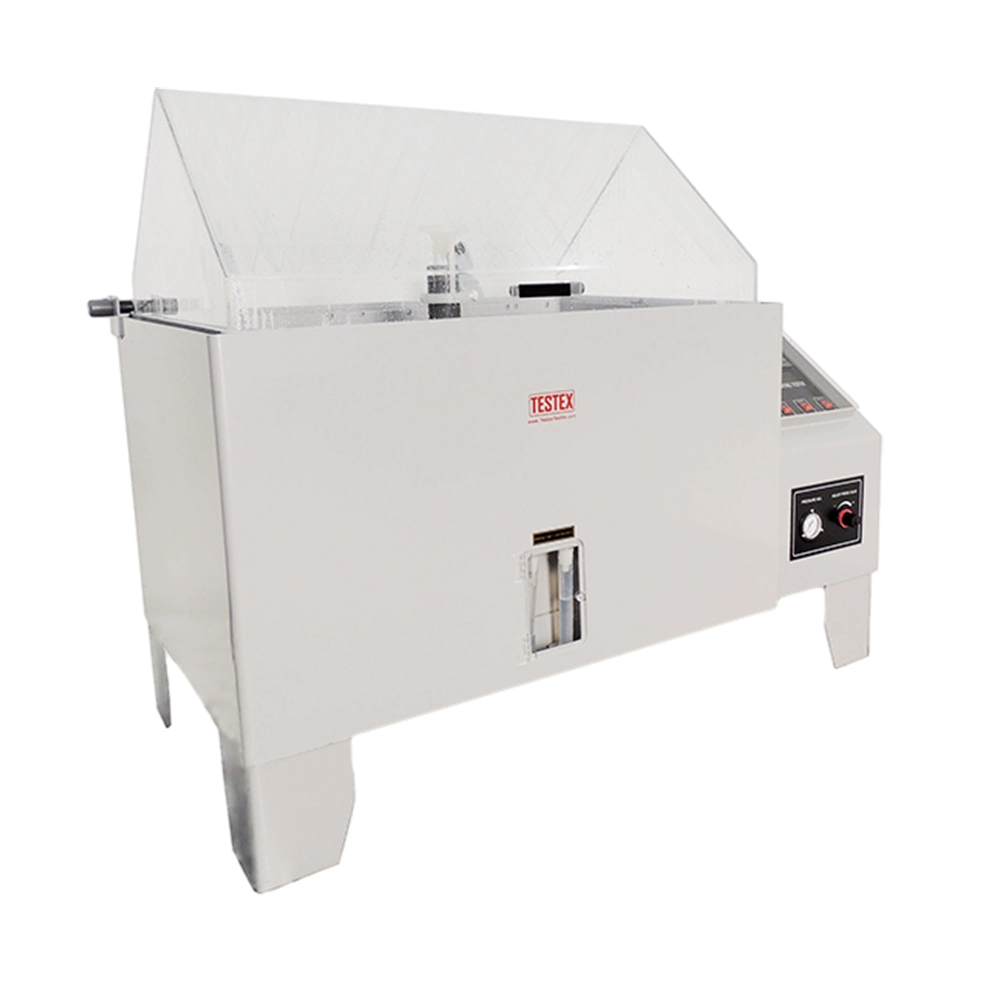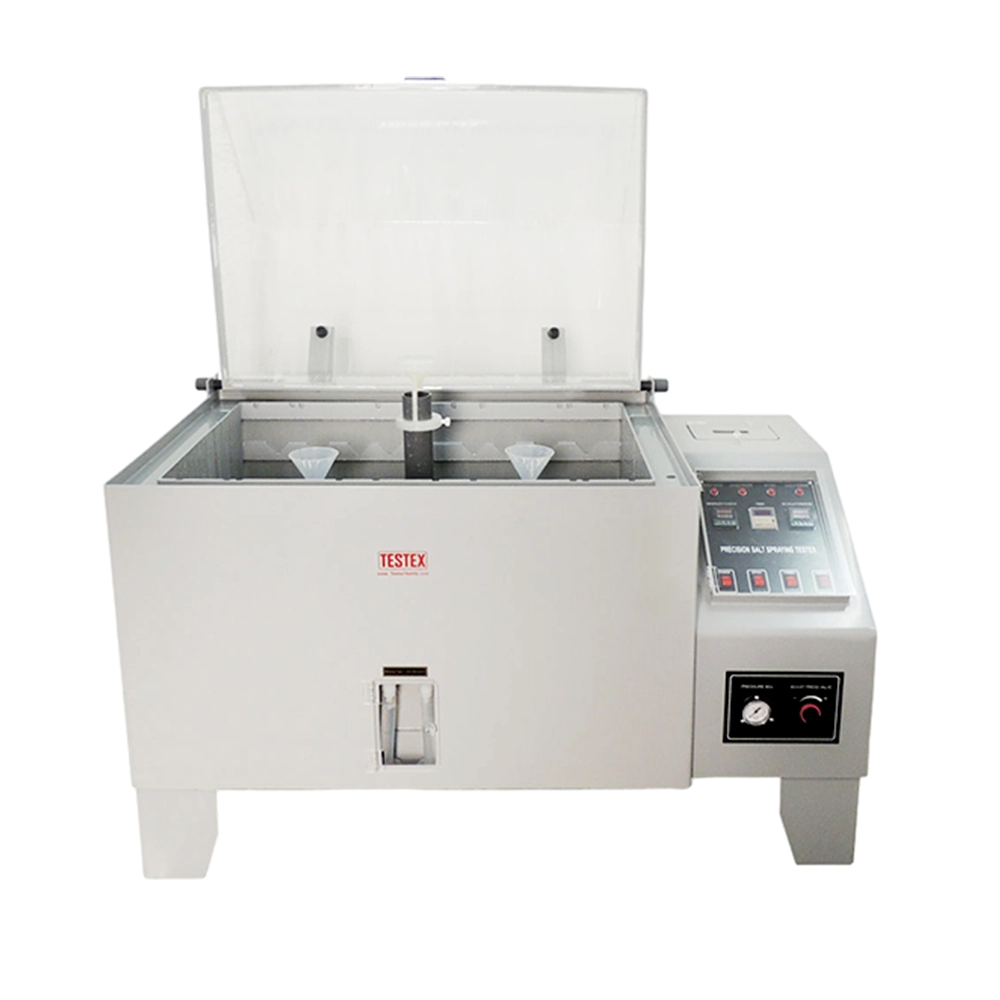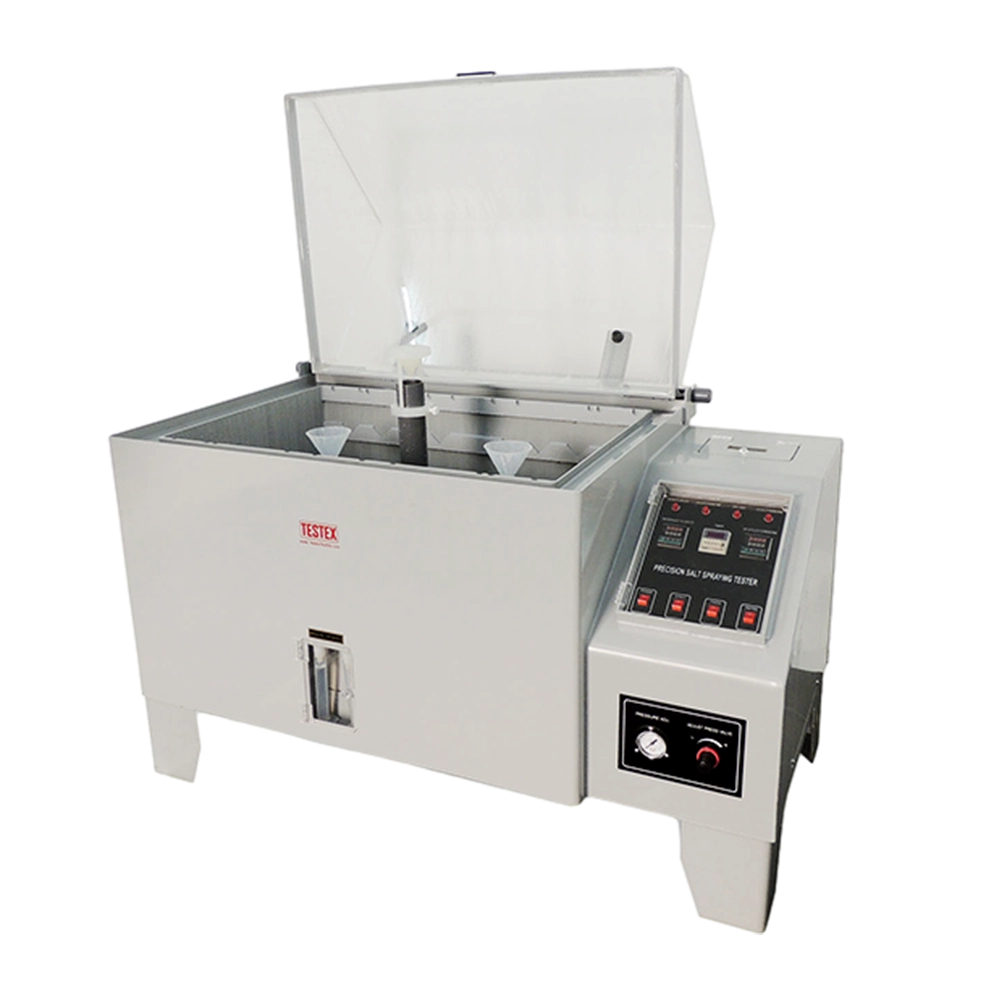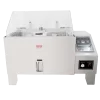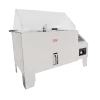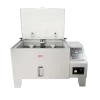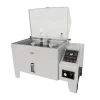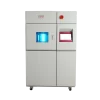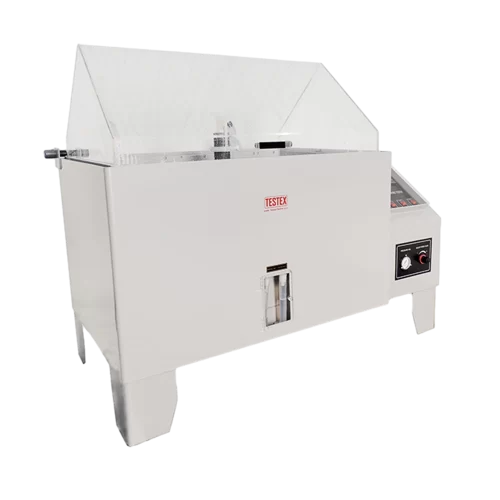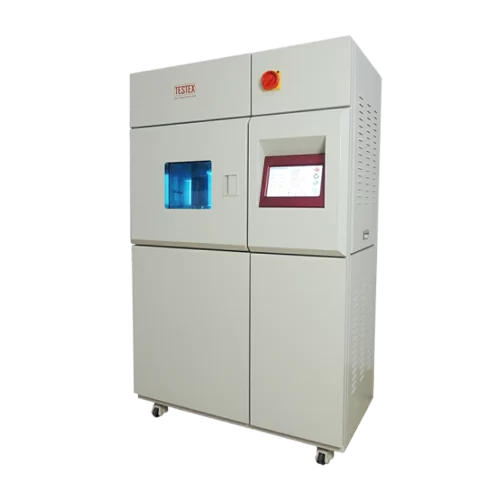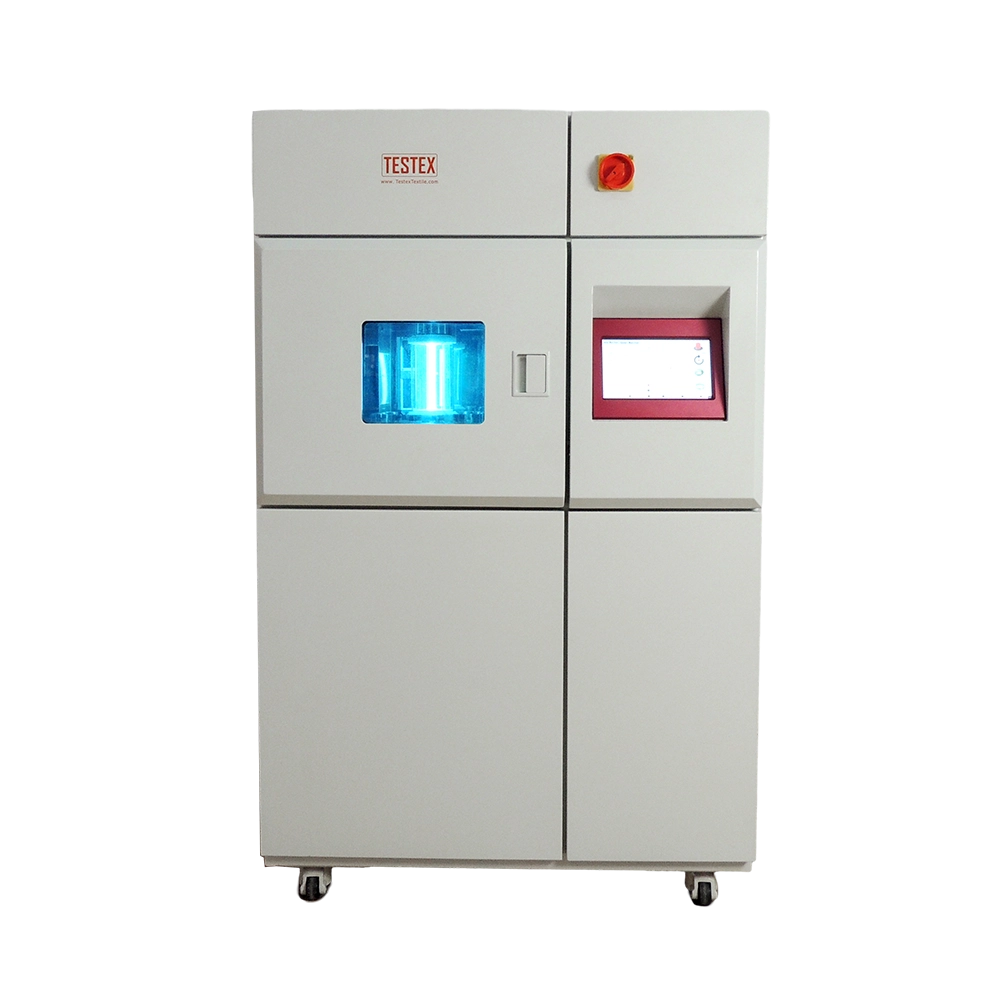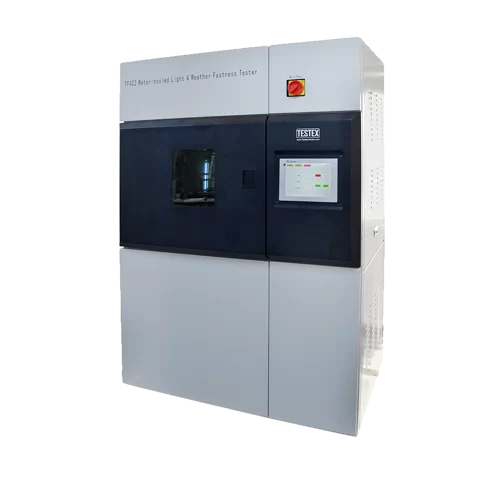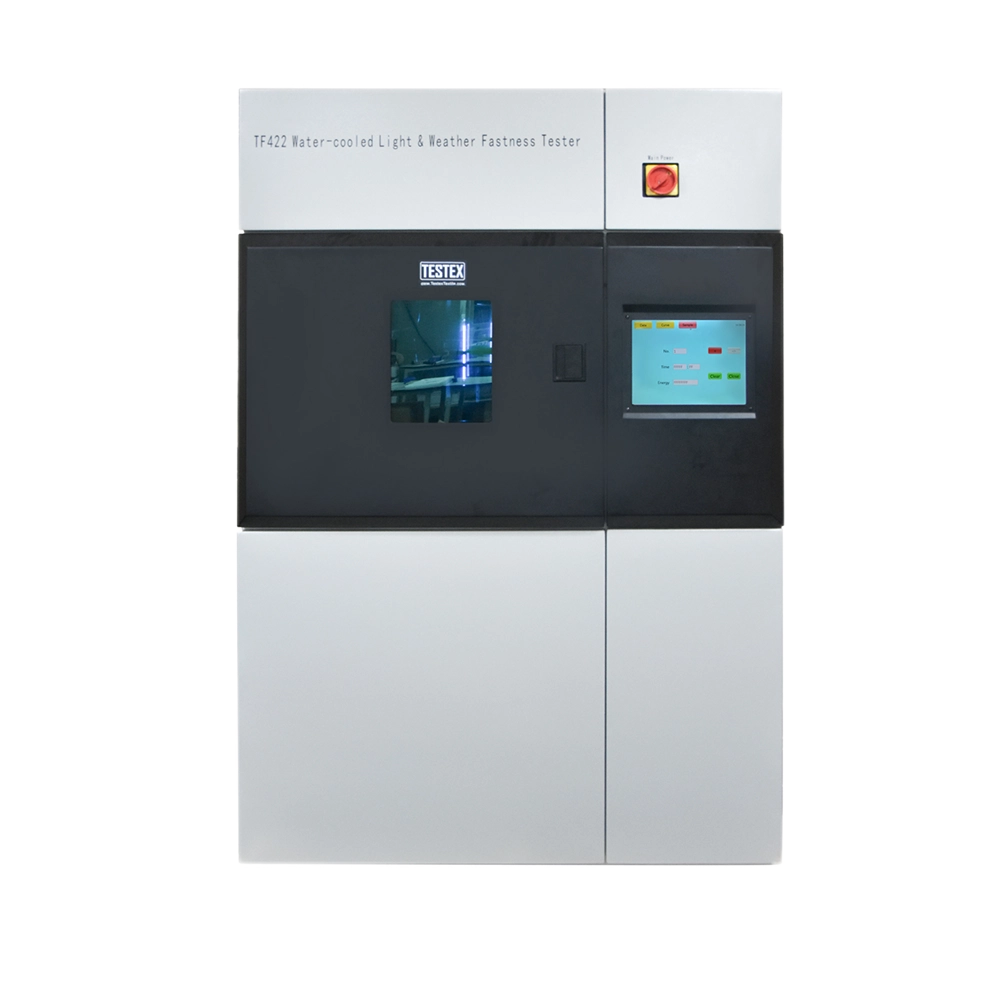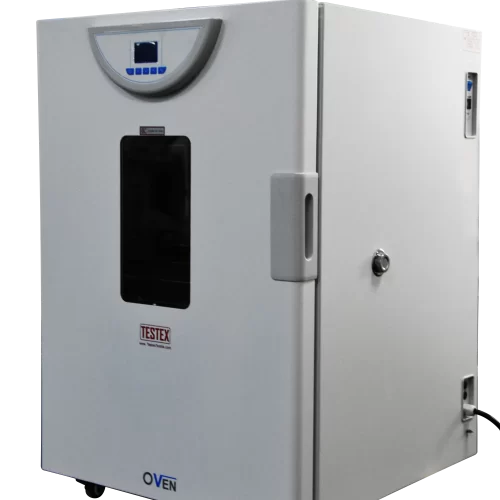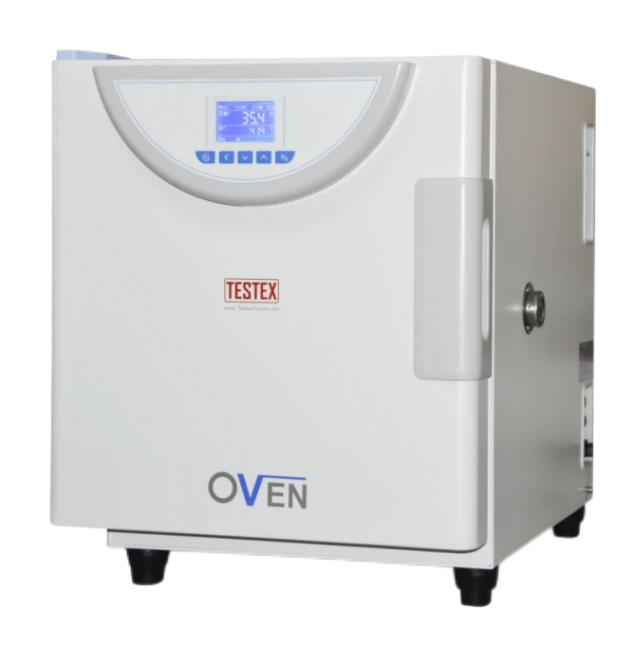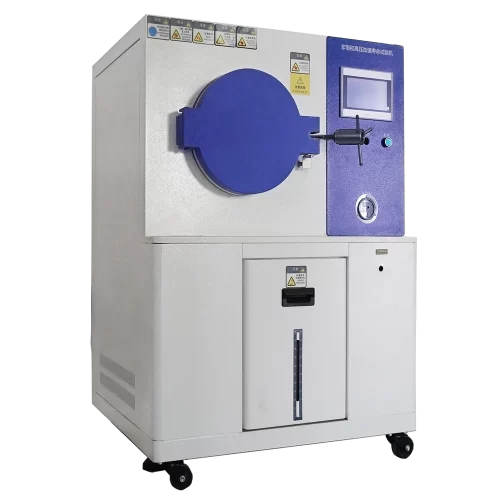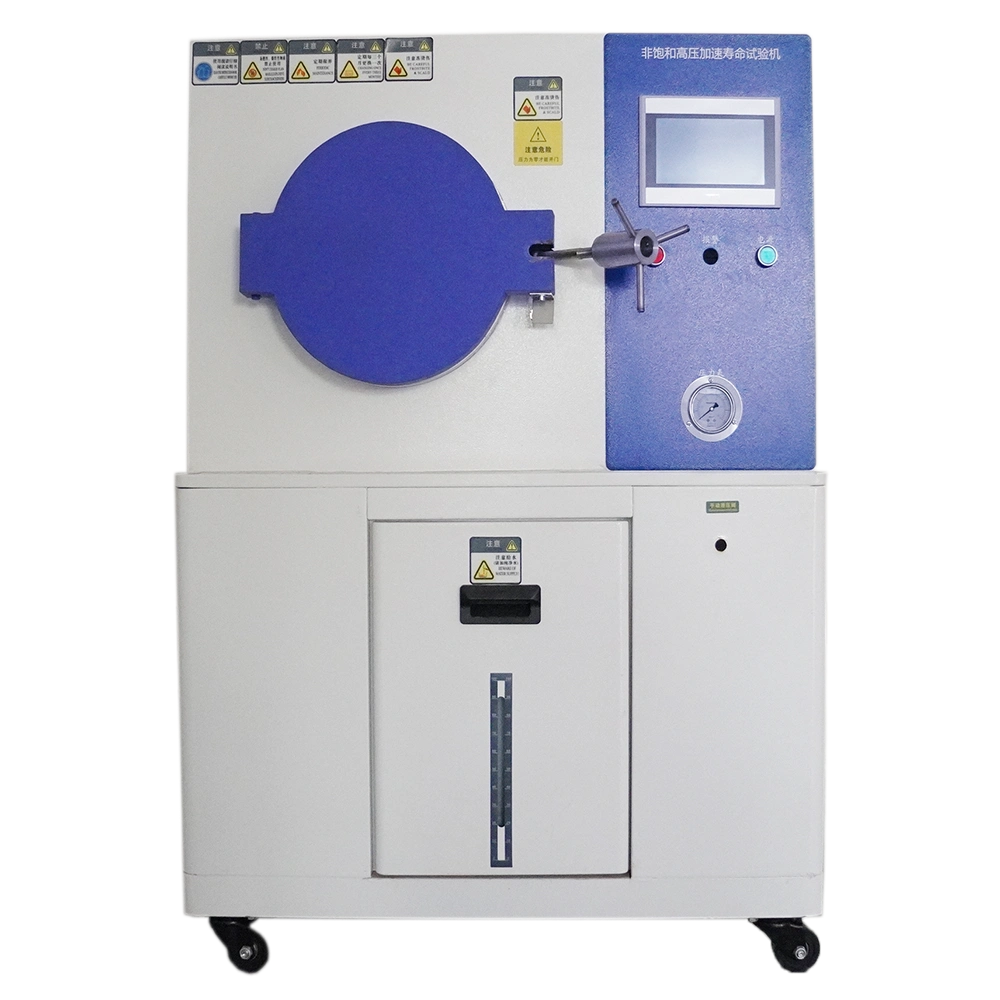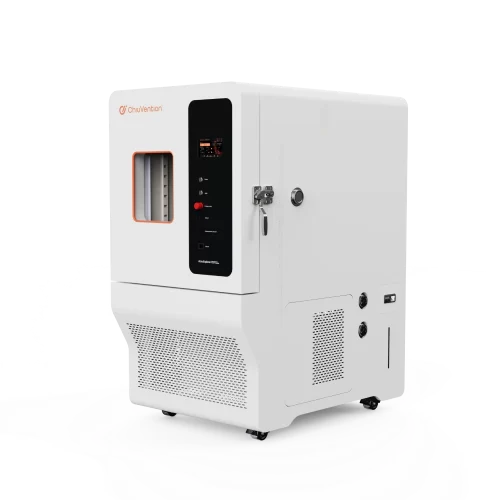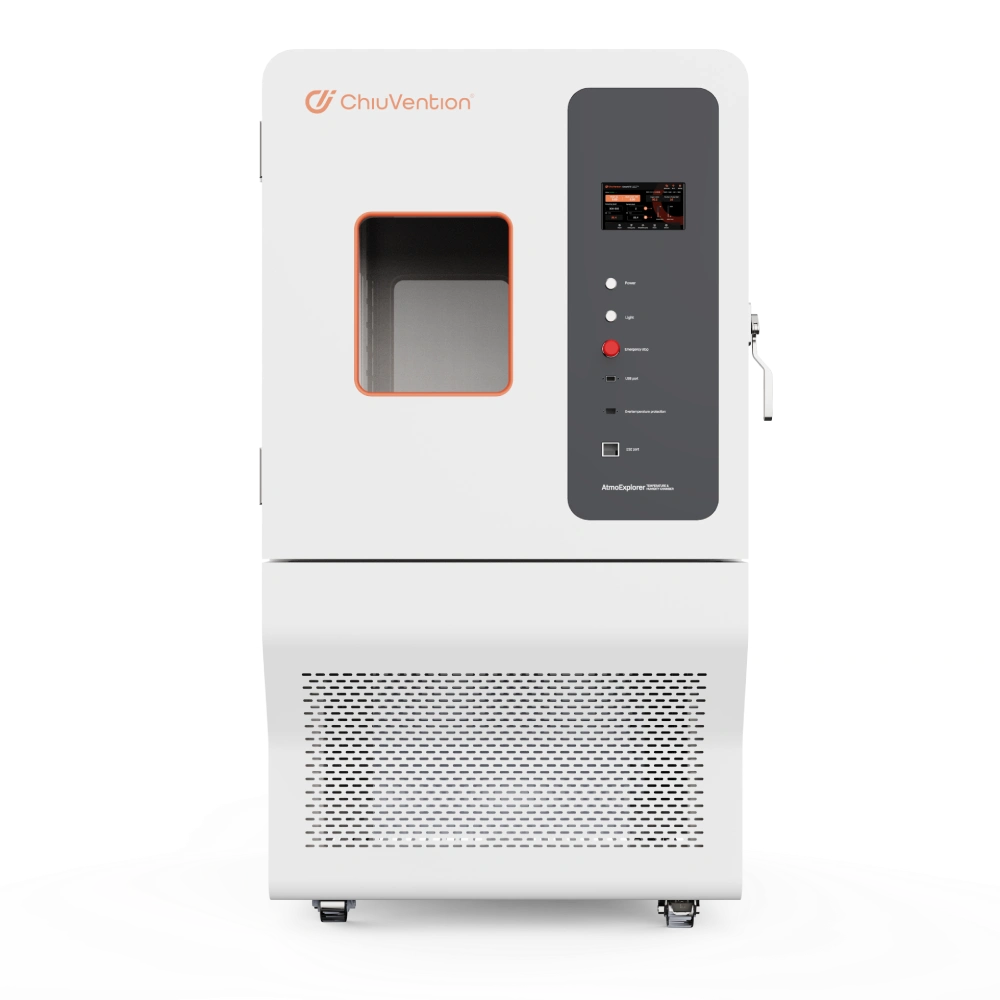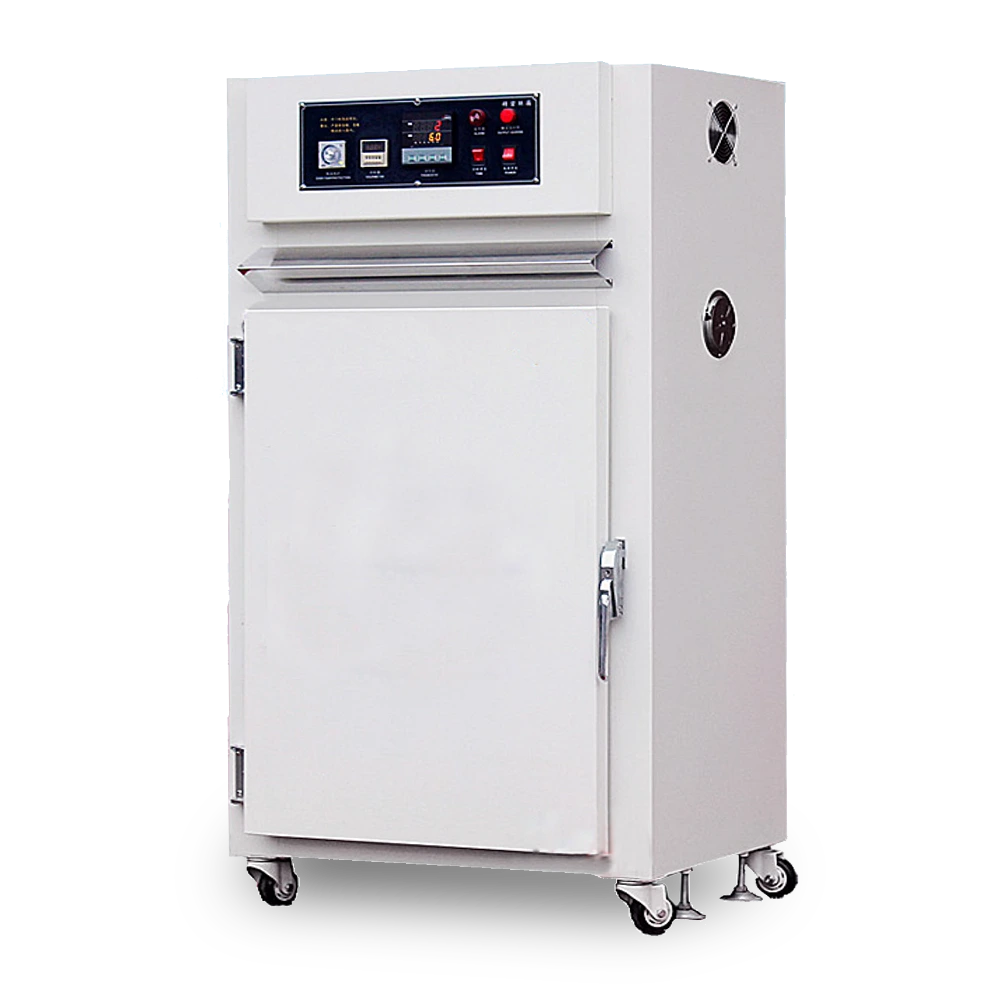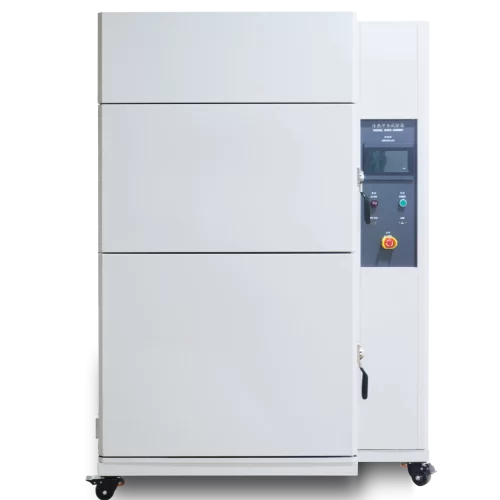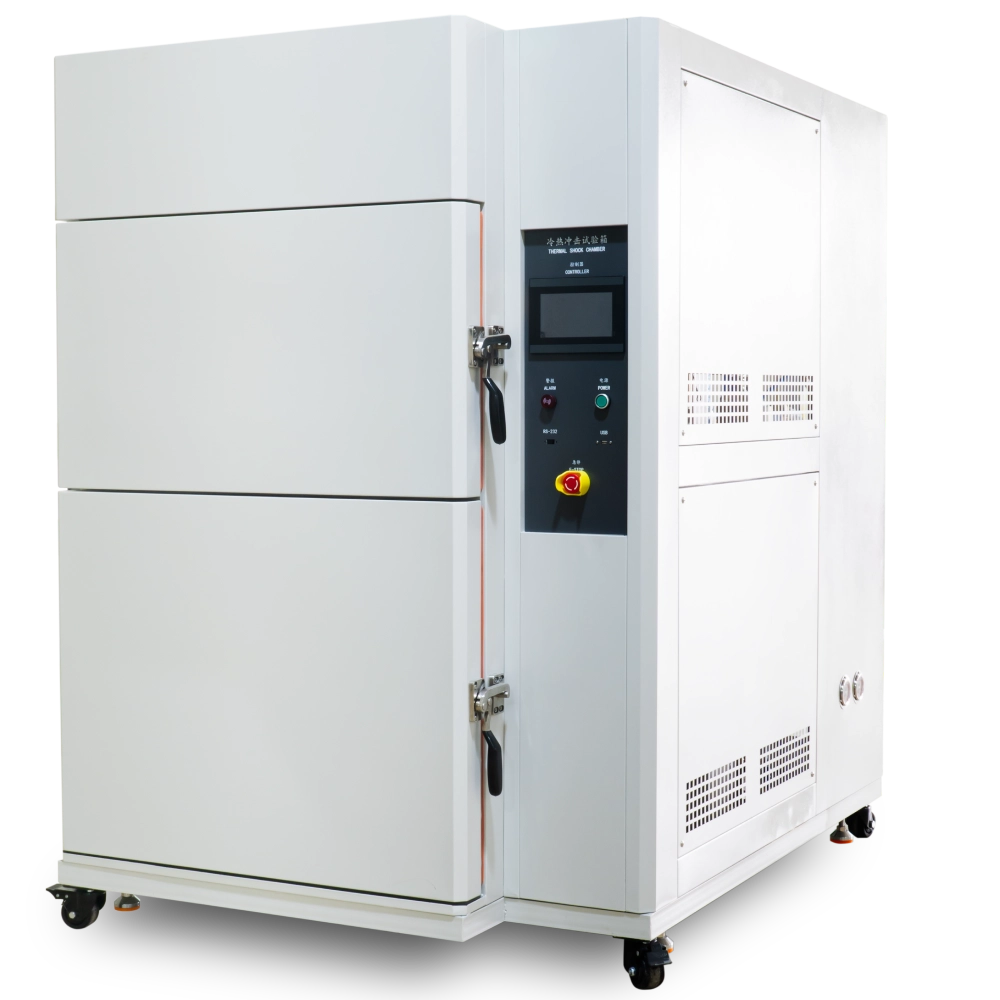Salt Spray tester specification:
| Test Chamber: | 108 L or 270 L |
| Test Solution Volume: | 15 L |
| Temperature Test: | NSS.ACSS 35℃±1℃, CASS 50℃±1℃ optional. |
| Air Temperature: | NSS.ACSS 47℃±1℃, CASS 63℃±1℃ optional |
| Internal Dimensions: | 600 x 450 x 400mm or 900 x 600 x 500mm |
| External Dimensions: | 1060 x 570 x 1060mm or 1420 x 980 x 1285mm |
| Weight: | 164kg |
| Power: | 220V 50/60Hz 4kW or 6kW |
| Package Size: | 108 litres: 1260 x 860 x 1300mm 270 litres: 1620 x 1060 x 1450mm |
| Standard: | GB/T 2423.17 ASTM B117 |
Main characteristics of the salt spray test chamber:
- Equipped with a spray regulator for easy adjustment of spray density.
- A heater at the salt spray chamber’s bottom heats water and maintains temperature.
- Salt spray test machine has a sealed water tank. It uses the water seal principle to avoid spray leakage.
- The outer and inner housings of the salt spray tester are made of PVC. PVC provides better protection against corrosion. Clear test shell, easier to observe the test situation.
Features of salt spray chamber
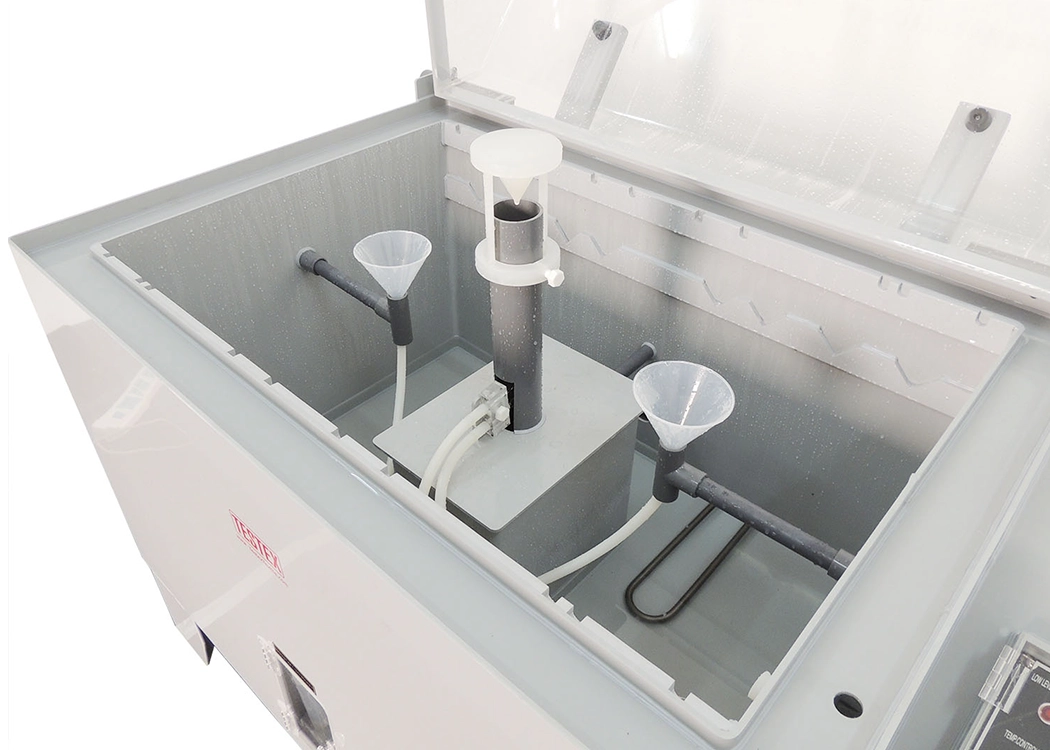
Automatic demisting to avoid spray leakage
The exhaust pipe is 48mm in diameter and made of PVC-U. It is outside with a mist eliminator. There is no water buildup. This lets the fog leave on its own. It has a sealed water tank. It uses the water seal principle to avoid leaks.
Spray adjustable, uniform degree of atomization
Equipped with a spray regulator, easy to adjust the spray density. If you turn to the high position, the spray gets denser. If you turn to the low position, the spray gets less dense.
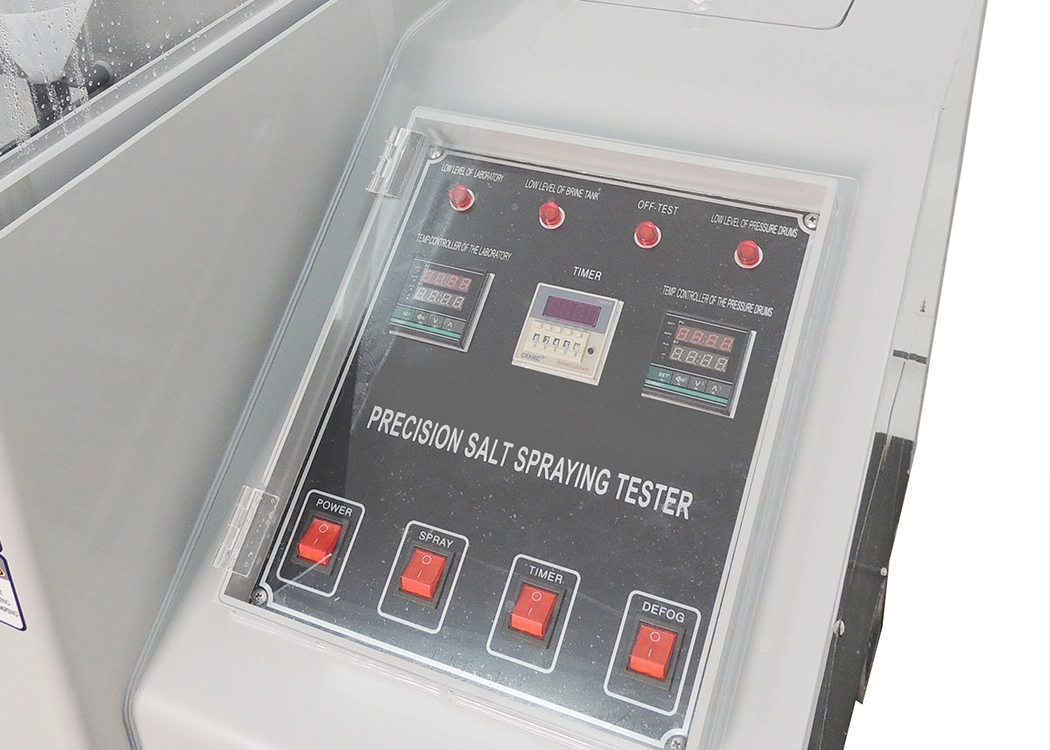
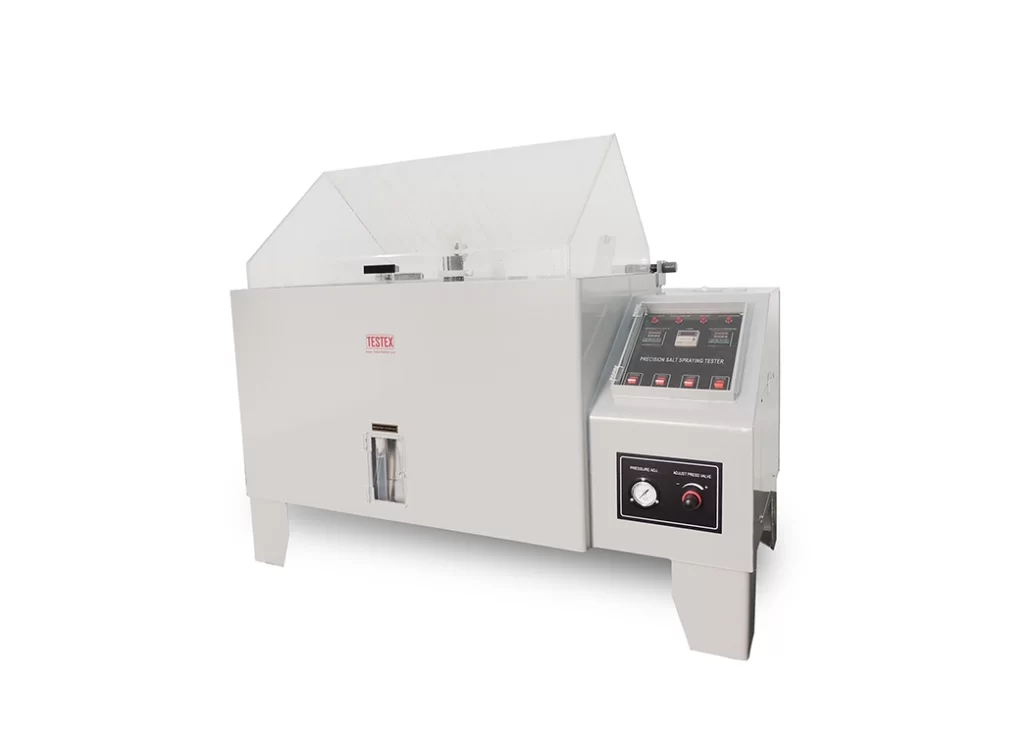
Anti-corrosion and temperature resistance, easy to observe
The shell and liner of the salt spray chamber are made of PVC, which has better corrosion resistance. The test lid has a 100-degree slant. It is see-through and covers the top of the test chamber. The test shell is clear, making it easier to see the test.
Automatic water level control
The brine preheating tank is at the bottom of the spray tower. The brine is injected through the refill bottle. The water level is automatically controlled by a float and a drain is installed at the bottom of the tank.
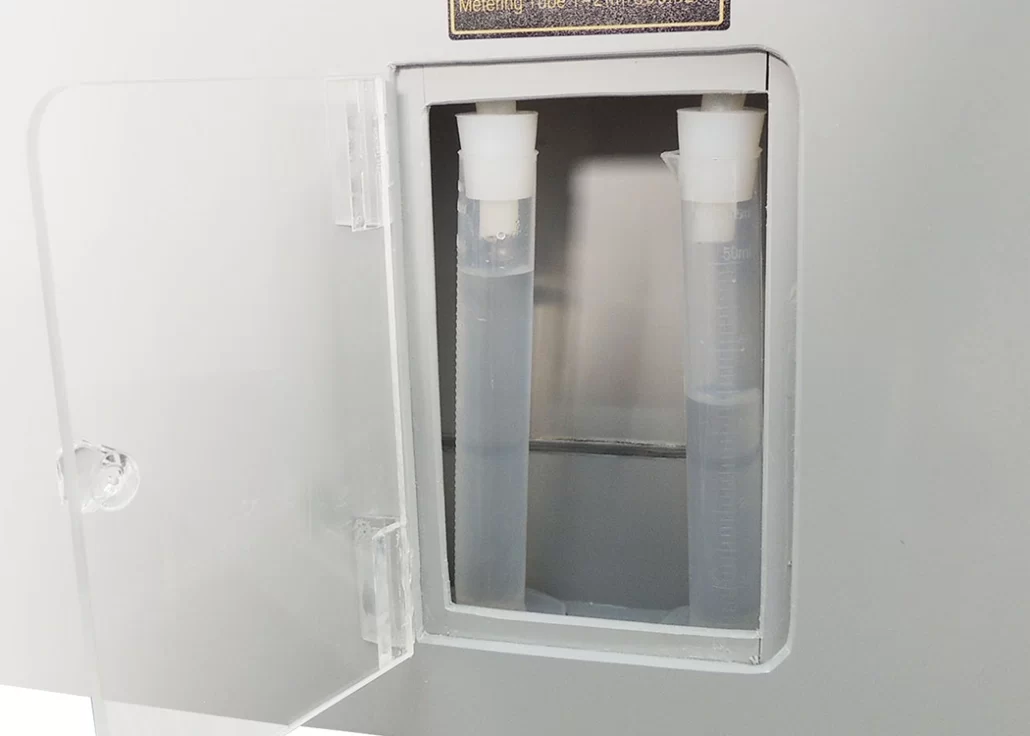
FAQ About Salt Spray Tester
A salt spray test chamber is a device used to simulate salt spray corrosive environments by spraying a sodium chloride aqueous solution onto the surface of the object under test to conduct corrosion experiments to assess its corrosion resistance and thus determine its suitability as well as its lifespan and other parameters.
1、Materials research
It can be used to study the corrosion resistance of different materials in different corrosive environments. Through salt spray testing, researchers can simulate and test a variety of natural corrosive environments, such as marine environments, industrial atmospheres, etc., in order to assess the corrosion resistance of materials. These studies help to understand the corrosion mechanisms of materials in different environments and provide a basis for material development and optimisation.
2、Quality control
It can also be used for quality control in industrial production. In the manufacturing process, salt spray testing of materials can detect the corrosion resistance of materials to ensure product quality. Especially in the automotive, marine, petrochemical and other fields, the application of salt spray test chamber is particularly important, because the materials in these fields need to have high corrosion resistance.
3、Product development
In the product development stage, can be used to assess the corrosion resistance of the product. For example, for a metal part or a coating, through the salt spray test can understand its corrosion resistance, and predict its service life in a particular environment. This type of testing helps product designers and engineers to optimise the design of their products and improve their durability and reliability.
4、Environmental protection
It can be used to study atmospheric pollution and environmental corrosion. By simulating the salt spray corrosion process under different environmental conditions, researchers can assess the impact of atmospheric pollutants on the corrosion of materials, providing a basis for environmental protection decisions. For example, in the study of marine pollution and air pollution, salt spray test chamber is used to study the corrosion mechanism of metal materials and the effectiveness of environmental protection measures.
- Automotive industry: The corrosion resistance of automobiles and parts is an important factor in ensuring driving safety and extending service life. Automobile manufacturers can use the salt spray test chamber to assess the durability of the body, chassis, exhaust system, and other components in the marine environment and obtain reliable data support.
- Electronic industry: Modern electronic equipment is widely used in various fields, and salt spray corrosion in the marine environment on the damage caused by electronic products can not be ignored. Salt spray test chambers can be used to protect product quality and improve reliability. Electronic components, circuit boards, and other salt spray corrosion tests use them.
- Aerospace industry: The salt spray test chamber in the aerospace industry is widely used. Aircraft fuselage, engine, hydraulic system and other components in the marine environment is directly related to the performance of aircraft safety. Through the salt spray test chamber can assess the corrosion resistance of aerospace products to ensure their reliability in harsh environments.
- Metal materials industry: Salt spray test chambers are vital for assessing the corrosion resistance of all types of metal materials and coatings. For example, for the paint and coating industry, salt spray test chambers can verify the corrosion resistance and durability of their products to ensure product quality.
- Identify problems in advance:
Salt spray test chambers can simulate salt spray corrosion in harsh environments, helping manufacturers to identify potential quality problems before placing their products on the market to avoid affecting brand reputation and user experience. - Optimise product design:
Manufacturers use salt spray test results to analyze product performance in various environments. They can then enhance product design, improving corrosion resistance and reliability. This ensures users receive higher-quality products. - Meet industry standards and requirements:
Many industries have clear standards and requirements for the corrosion resistance of products. Through the salt spray test chamber for testing, manufacturers can ensure that the product meets the relevant industry standards, and to meet the needs of customers to enhance market competitiveness. - Cost savings:
During the product design and manufacturing phase, the salt spray test chamber helps identify and solve quality issues. This prevents costly repairs later on, saving money. - Enhance brand trust:
Companies can use salt spray test chambers to check if their products resist corrosion. This helps them establish a trustworthy brand image and gain customer trust. This will help expand market share and gain more customers and partners.
- Metals and their alloys
- Plating and film, including metal coverings, organic coverings, anodic oxide film
Organic coverings, such as paint, varnish, powder coating (powder), rust preventive oils, etc…
Metallic coverings, such as electroplating, chemical plating, ion plating, spray plating, hot dip plating, chemical vapour deposition, etc.. Commonly used electroplating layers are zinc plating, copper plating, nickel plating, chromium plating, tin plating and brass plating, lead and tin alloy plating. - Electronic products
(1) Road traffic: road vehicle electrical and electronic equipment, rail transit rolling stock machinery and equipment, automotive parts and components.
(2) Computer: computers, displays, hosts, computer components, medical equipment and other precision instruments.
(3) Electronic communications: mobile phones, radio frequency devices, electronic communications components, PCB, PCBA.
(4) Electrical appliances: home appliances, lamps and lanterns, transformers and other types of home appliances and electrical equipment, instruments, medical equipment.
The salt spray tester checks if materials resist corrosion after surface treatments like paint or coatings. It tests electroplating, anodic treatment, and rust prevention. It uses a solution of sodium chloride as the test liquid and applies mist to the coated film to simulate corrosion. The tester is crucial for studying materials and testing products in industries such as national defense, electronics, and instrumentation.
Preparation of test equipment and test samples
Salt spray test equipment usually consists of test chambers, heaters, nebulizers, brine storage tanks, compressed air systems and so on. Test samples should be selected according to the actual use of the situation, such as metal materials, coatings, electronic components and so on.
Preparation of brine solution
The preparation of brine solution should be determined according to the test standards and actual use. Usually the concentration of brine used is 5%~10% and the pH value is 6.5~7.2. The brine solution should be stirred well before the test.
Conducting the test
Place the test sample in the test chamber and adjust the temperature and humidity of the test chamber so that it meets the requirements of the test standard. Then spray the brine solution onto the surface of the test sample and keep it there for a certain period of time before removing the test sample for observation and testing.
Observation and testing test results
Observe the corrosion on the surface of the test sample, such as the appearance of rust spots, corrosion, discoloration and other phenomena. Meanwhile, conduct relevant tests, such as resistivity, current density, weight loss, etc., to evaluate the corrosion resistance of the test sample.
The purpose of the salt spray test is to assess the salt spray corrosion resistance of a product or material, and to determine whether the results of the salt spray test are a correct and reasonable judgement of the quality of the product, and whether the results of the salt spray test are correct and reasonable, which is the key to the correct measurement of the quality of the product’s or material’s resistance to salt spray corrosion.
Salt spray corrosion is a common and destructive form of atmospheric corrosion. Salt spray is an atmosphere containing chlorides, mainly originating from the ocean and saline areas of the interior, and its main corrosive component is sodium chloride. Chlorine ions penetrate the oxidized and protective layers on the surface of the metal and react chemically with the internal metal to form corrosion. And chlorine ions have a certain hydration energy, simple adsorption on the metal surface and replace the oxygen in the chlorinated layer, so that insoluble oxides into soluble chlorides, so that the passivation state surface into active surface. This makes the product more susceptible to corrosion and affects all aspects of its performance.
Salt spray testing is an environmental test that uses salt spray test equipment to simulate artificial salt spray environmental conditions to assess the corrosion resistance of products or metallic materials.
These tests can be divided into two categories, natural environment exposure tests and artificially accelerated simulated salt spray environment tests. In an artificially accelerated simulated salt spray test, a salt spray test chamber is used to create a salt spray environment that accelerates the corrosion process by atomising a certain concentration of brine and spraying it in a closed, constant-temperature chamber. Compared with the natural environment, the salt concentration of chloride in an artificially simulated salt spray environment may reach several or tens of times the salt spray content of the natural environment, thus significantly increasing the corrosion rate and enabling the assessment of the corrosion resistance of products to be completed in a very short period of time. This type of test is commonly used to check the corrosion resistance of metal products, coatings, electronics, etc. in marine climates or high-salt environments.
Firstly, it can simulate the salt spray conditions in the marine environment to assess the corrosion resistance of products in actual use.
Secondly, it can provide quantitative corrosion data, such as corrosion rate, corrosion amount, etc., to provide a basis for product quality control and reliability assessment.
In addition, salt spray test inspection has the advantages of being fast, reliable and repeatable, which can be widely used in product development, production and quality control.
Firstly, it is necessary to choose salt spray test methods and equipment that meet the standard requirements to ensure the accuracy and stability of the test conditions. Secondly, the operation should be carried out in strict accordance with the test procedures to avoid human errors and operational mistakes. In addition, the representativeness and consistency of the specimens should be ensured to avoid errors in the test results due to differences in the specimens. Finally, the test results should be analyzed and evaluated accurately to avoid the influence of subjectivity and empiricism.
Firstly, you need to select the appropriate salt spray test method and equipment, and determine the test conditions, such as temperature, humidity, spray volume, salt solution concentration, and so on.
Secondly, samples need to be prepared, and the products or materials to be tested need to be made into standard-sized specimens, which are cleaned and dried. Then, the specimen is placed in a salt spray test chamber and tested according to the set conditions. During the test, the corrosion of the specimen needs to be observed regularly, and data such as the morphology, distribution and amount of corrosion products are recorded.
Finally, the corrosion resistance of the product is analysed and evaluated based on the observations and data.
- Firstly, salt spray testing is a test method that simulates a marine climate environment by generating a salt spray environment in a salt spray chamber and exposing samples to assess their corrosion resistance. Salt water immersion testing, on the other hand, involves immersing samples in salt water to simulate the corrosion of materials in a humid environment.
- Secondly, the salt spray test is usually used to assess the corrosion resistance of metallic materials and coatings, especially for external coatings such as sprays and plating. The salt water immersion test is more often used to assess the corrosion resistance of the material itself, e.g. non-metallic materials such as plastics and rubber.
- In addition, the salt spray test is usually carried out under constant temperature and humidity conditions, usually in the temperature range of 35°C to 50°C, and the test time is usually several hundred hours. The salt water immersion test, on the other hand, involves immersing the sample in salt water for a period of weeks or even months.
- In addition, the advantage of the salt spray test is that it can accelerate the corrosion process and the test results are more intuitive, but it can not completely simulate the actual use of the environment. The salt water immersion test is closer to the actual use environment, but the test period is longer and the evaluation of the results is relatively subjective.
1. The salt spray test chamber itself has errors
Design, manufacture, verification and other imperfections, as well as salt spray test chamber in the use of parts aging, mechanical parts wear and tear, fatigue and other phenomena will cause errors. Not only these components will cause errors, and each auxiliary equipment or accessories may cause errors.
2. Test method
Salt spray test chamber operation method should be carried out in accordance with the correct standardised steps, the test method should also be reasonable and perfect. When the equipment test theory is not strict, the operation is not reasonable, the test results with an approximate formula or approximate value of the calculation, will also cause test errors.
3. Environment and operators
As the actual environmental conditions are inconsistent with the specified conditions, mainly including temperature, power supply voltage and electromagnetic interference, these environmental conditions will also cause test errors. In addition, improper operation of the operator will also affect the test results, may be due to poor staff resolution, slow detector speed, inherent bad habits and other reasons.
4. Test sample instability
Salt spray test requires a certain amount of time. If the sample is unstable or changes during the test time, the salt spray tester cannot obtain accurate test data.
In addition to errors caused by operator error and serious damage to the salt spray test chamber, slight errors in other standard operations do not affect the test results of the product as long as they are within tolerance.
1. Installation place The salt spray tester should be installed in a dry, ventilated, dust-free, non-corrosive gas and particulate matter environment. Room should maintain a reasonable temperature and humidity. Salt spray test chamber should be enough space around the installation and work, should not exist in the obstacles, in order to facilitate the maintenance and operation of the equipment.
2. Ventilation The salt spray tester normally uses hydrogen chloride (HCl) to prepare the salt spray and the ventilation system must ensure that harmful gases are removed from the chamber in a timely manner. If the ventilation system is not good, the acid mist generated by hydrogen chloride in the salt spray test chamber will cause corrosion damage to equipment and components, and even affect the test results.
3. Power supply system As a precision instrument, the salt spray test chamber requires high quality and stability of the power supply. Therefore, when installing the salt spray tester, you need to ensure that the power supply is wired correctly, the power supply is stable, and the voltage and current can meet the specific requirements of the equipment.
4. Water system The salt spray test chamber needs to use pure water and hydrochloric acid, and should be connected to the water source during installation. When installing the salt spray test chamber should ensure that the water quality of the water source is clean and pure, and connect the test chamber with the water source firmly and reliably.
5. Environmental control system The environmental control system of the salt spray tester includes temperature control system, humidity control system, and air pressure control system. These systems must be reliable and stable to ensure the accuracy and reliability of the test data.
6. Test article racks Test article racks are the racks used to place test materials and equipment in the salt spray test chamber. The number and height of test article racks must comply with the test requirements and be installed in the correct position to ensure that the materials and equipment are adequately tested in the salt spray environment.
7. Safety Equipment The salt spray test chamber should be located in a place where there is a person in charge, and equipped with appropriate safety measures, such as emergency power failure. In addition, during use, the operator must wear safety devices and protective equipment to ensure personal safety.
Cleaning methods for salt spray test chambers include cleaning of the chamber shell and exposed parts, cleaning of the inner chamber, brine tank, saturated drum, water seals, and cleaning and inspection of electrical components.
Box shell and exposed parts of the cleaning: use water or mild detergent to wipe the box shell and visible parts, cleaning should ensure that the power has been turned off, use a soft cloth or sponge to avoid scratching the shell surface. Focus on cleaning the areas where dust and stains may accumulate, such as control panels, observation windows, etc., to keep the appearance of the equipment neat and clean and free of foreign matter attached.
Cleaning of inner box, brine tank, saturated drum, water seal:
Cleaning of the inner box: Immediately after each test, flush the inner box with clean water to thoroughly remove oil and salt spray residues. If there are stubborn stains on the wall of the inner box, a neutral cleaner can be used to assist in cleaning to ensure that there is no accumulation of water.
Brine tank cleaning: Empty the solution in the brine tank after the test and rinse with water several times until no salt residue. When not in use for a long time, thoroughly clean and dry the brine tank.
Saturated drum cleaning: After the test, open the drain valve of the saturated drum and drain the water accumulated in the drum. Regularly check whether the heating element and temperature sensor of the saturated tank are working properly.
Water Seal Cleaning: Clean the water seal with special care, use mild detergent or alcohol to wipe the surface and remove stains and residues so as not to affect the sealing performance of the test chamber.
Nozzle cleaning and maintenance: If the nozzle is found to be clogged, remove the nozzle and clean it by soaking it in a solvent such as alcohol, xylene or 1:1 hydrochloric acid. If the clogging is serious, you can use ultra-fine steel wire to unclog, but need to pay attention to not damage the surface finish of the inner cavity of the nozzle.
Cleaning and inspection of electrical components: mainly clean dust and check whether the wiring is aging. Use a brush or hoover to gently remove dust from the surface of the components, and avoid using a wet cloth or liquid cleaner to directly contact the electrical components. At the same time, check whether the equipment is connected properly.
By following these steps, you can ensure that the salt spray tester is thoroughly cleaned to maintain equipment performance and ensure the accuracy of test results.
The operation of draining brine out of a salt spray tester involves several steps, including draining and discharging the brine solution.
Firstly, the draining process involves:
Switching off the power switch of the salt spray tester to ensure that the unit is off.
Opening the drain valve to allow the brine solution to drain through the drain.
For draining the brine solution, the following steps are typically involved, although the exact steps may vary depending on the equipment model and design:
Locate the storage location for the brine solution, this is usually a reservoir or brine preheat tank.
Drain the brine solution by opening the drain valve at the storage location or through the unit’s drain function.
Ensure that the draining process is complete by closing the drain valve or stopping the drain function.
In addition, in order to keep the equipment in good operating condition, it is necessary to carry out regular maintenance and repair of the equipment, including, but not limited to, cleaning the interior of the salt spray test chamber, replacing damaged parts, and so on. These operations should be performed in accordance with the equipment’s instruction manual or maintenance guide to ensure safety and long-term use of the equipment.
In summary, the salt water discharge process of the salt spray tester needs to be operated carefully, following the equipment’s operating instructions and safety practices to ensure safe operation and proper functioning of the equipment.
Salt spray testing is mainly used to test the corrosion resistance of materials and is particularly suitable for metallic materials, coatings, anti-corrosion materials, electronic components, etc.
This type of test evaluates the durability and reliability of materials in salt-containing media such as marine, coastal or industrial environments by simulating these environments. Metallic materials such as steel, copper, aluminium and zinc, as well as their alloys, can be tested for their corrosion resistance and performance in similar marine environments through salt spray testing. Coatings and electroplated films such as chrome, zinc, nickel, etc. are tested for their corrosion resistance and the effect of the coating on the adhesion and durability of the material. In addition, electronic components are often tested for corrosion resistance and adaptation to salt spray environments through salt spray testing.
Non-metallic materials such as plastics, rubber, ceramics, etc. can also be subjected to salt spray testing to assess their corrosion resistance. There are also different types of salt spray tests, such as neutral salt spray tests, acetic acid salt spray tests and copper accelerated salt spray tests, which are applicable to different types of materials and coatings.
The process of atomising brine in a salt spray test chamber involves a number of steps to ensure the accuracy and safety of the salt spray test. The following is the detailed operation process:
Preparing the brine: first, the brine test solution needs to be prepared. This usually involves dissolving a certain amount of sodium chloride (NaCl) in pure water to obtain the desired brine concentration. For example, for a neutral salt spray test, a common brine concentration is 700g of the industrial salt sodium chloride (NaCl) in 5,000ml of pure water, stirred well.
Connect the power supply and air source: Make sure the salt spray test chamber is connected to the power supply, and connect the air compressor as the air source. The function of the air compressor is to compress the air and provide the necessary air source for the spray test.
Filling water and brine: add pure or distilled water to the inlets inside and behind the salt spray test chamber until the low water light on the panel goes out. At the same time, add the previously prepared brine test solution through the test inlet so that the brine test solution flows into the brine preheating tank.
Setting temperature and time: Set the temperature of the test chamber, usually 35°C, and the temperature of the pressure drum, usually set to 45°C. Set the test time to 12 hours or other specific time.
Start spraying: Switch on the power switch of the salt water spray tester, activate the instant spray switch and timed spray switch to start spraying. At the end of the test, gently wash off the salt deposits on the surface of the test specimen using running water and rinse in distilled water as needed, and then recover for 2 hours under indoor atmospheric conditions.
Abnormal handling: If abnormalities occur during the test, they should be handled with reference to the Functional Abnormal Judgement Table.
Through the above steps, the atomised salt water operation of the salt spray test chamber can be completed to ensure the accuracy and safety of the test.
- According to the test method can be divided into neutral salt spray test, acetate spray test and copper accelerated acetate spray test;
- According to the test temperature can be divided into normal temperature salt spray test and high temperature salt spray test;
- According to the exposure mode can be divided into intermittent salt spray test and continuous salt spray test.
